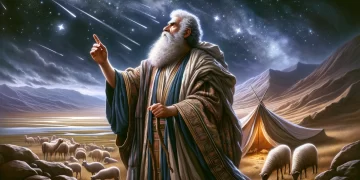Views: 0
In-Depth Study of “Joseph’s Brothers in Egypt” (Genesis 42:1-45:28)
Date of Events & Date of Writing & Primary Audience
- Date of Events: The events likely occurred around 1875-1865 BC, during the time of the Middle Kingdom in Egypt.
- Date of Writing: The writing of Genesis is traditionally attributed to Moses around 1446-1406 BC.
- Primary Audience: The primary audience includes the Israelites during their exodus from Egypt, providing them with historical and theological insights into their ancestry.
Story Summary
Joseph’s brothers travel to Egypt to buy grain during a severe famine. Unrecognized by them, Joseph tests their integrity before revealing his identity. Ultimately, he forgives them, and the family is reunited under his provision.
Story Background
Joseph, sold into slavery by his brothers, rises to power in Egypt by interpreting Pharaoh’s dreams, predicting seven years of plenty followed by seven years of famine. During the famine, Joseph’s brothers come to Egypt seeking food.
Story Highlights
- Joseph’s Test: Joseph accuses his brothers of being spies to test their honesty (Genesis 42:9).
- Silver in Sacks: Joseph secretly returns their payment for grain, causing fear and guilt in his brothers (Genesis 42:25-28).
- Second Visit: The brothers return with Benjamin; Joseph hosts a feast and plants a silver cup in Benjamin’s sack (Genesis 43:15-44:17).
- Judah’s Plea: Judah offers himself as a slave in place of Benjamin, showing transformation and responsibility (Genesis 44:18-34).
- Joseph’s Revelation: Joseph reveals his identity, forgives his brothers, and invites his family to live in Egypt (Genesis 45:1-15).
Story Purpose
To demonstrate God’s providential care and the fulfillment of His promises through Joseph’s elevation and the preservation of Jacob’s family, highlighting the importance of forgiveness and reconciliation.
Story Theme
Themes include divine sovereignty, forgiveness, repentance, and the preservation of God’s covenant people.
Jesus Connection
Joseph’s story foreshadows Christ’s role in salvation. Like Joseph, Jesus is betrayed, yet his suffering leads to the redemption of others. Joseph’s forgiveness of his brothers reflects Jesus’ forgiveness of sinners.
Kingdom Connection
Joseph’s governance in Egypt serves as a microcosm of the Kingdom of God, where mercy, provision, and justice prevail. The story underscores God’s ultimate plan to bring about His kingdom through His chosen people.
Archeology or Scientific Discovery
Archaeological evidence supports the historical plausibility of Joseph’s story within the context of Middle Kingdom Egypt. Findings such as Semitic settlements in the Nile Delta during this period align with the Biblical narrative.
Hebrew Meanings of the Keywords
- Mitzrayim (Egypt): Symbolizes oppression but also a place of divine providence.
- Shever (grain): Signifies sustenance and God’s provision during famine.
- Hesed (mercy/loving-kindness): Reflects Joseph’s treatment of his brothers despite their past actions.
Kingdom Teaching(s)
The narrative teaches about God’s sovereignty in using difficult circumstances for His divine purposes. It emphasizes forgiveness and reconciliation as central tenets of God’s Kingdom. Joseph’s elevation from slave to ruler exemplifies God’s redemptive power and the realization of His promises to Abraham’s descendants.
Scriptural Highlights
- (“Do this and you will live, for I fear God”) (Genesis 42:18).
- (“God sent me ahead of you to preserve for you a remnant on earth and to save your lives by a great deliverance”) (Genesis 45:7).
This in-depth study provides a comprehensive view of the story of “Joseph’s Brothers in Egypt” from the Kingdom of God perspective, focusing on key themes, theological insights, and connections to broader Biblical narratives.
![Joseph’s Brothers in Egypt [Genesis 42:1-45:28]](https://kingj.tv/wp-content/uploads/2024/04/Josephs-Brothers-in-Egypt-1140x570.webp)


![Creation of the World [Genesis 1:1-2:3]](https://kingj.tv/wp-content/uploads/2024/05/DALL·E-2024-06-01-23.50.14-A-vibrant-and-majestic-landscape-format-image-depicting-the-Genesis-story-of-the-Creation-of-the-World-360x180.webp)
![Isaac’s Birth and Sacrifice [Genesis 21:1-7; 22:1-18]](https://kingj.tv/wp-content/uploads/2024/04/Isaacs-birth-and-sacrifice-from-Genesis-21_1-7-22_1-18-360x180.webp)
![Cain and Abel [Genesis 4:1-16]](https://kingj.tv/wp-content/uploads/2024/04/Genesis-story-of-Cain-and-Abel-360x180.webp)
![Jacob’s Ladder [Genesis 28:10-22]](https://kingj.tv/wp-content/uploads/2024/04/Jacobs-vision-of-the-ladder-from-Genesis-28_10-22-75x75.webp)




